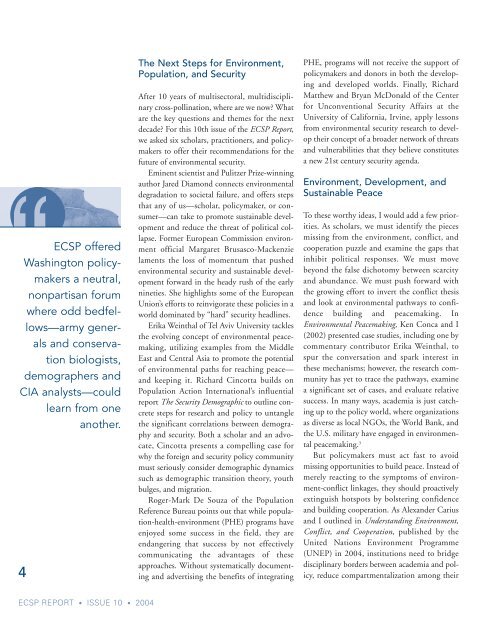Environmental Change and Security Project Report - Woodrow ...
Environmental Change and Security Project Report - Woodrow ...
Environmental Change and Security Project Report - Woodrow ...
Create successful ePaper yourself
Turn your PDF publications into a flip-book with our unique Google optimized e-Paper software.
ECSP offered<br />
Washington policymakers<br />
a neutral,<br />
nonpartisan forum<br />
where odd bedfellows—army<br />
generals<br />
<strong>and</strong> conservation<br />
biologists,<br />
demographers <strong>and</strong><br />
CIA analysts—could<br />
learn from one<br />
another.<br />
4<br />
The Next Steps for Environment,<br />
Population, <strong>and</strong> <strong>Security</strong><br />
After 10 years of multisectoral, multidisciplinary<br />
cross-pollination, where are we now? What<br />
are the key questions <strong>and</strong> themes for the next<br />
decade? For this 10th issue of the ECSP <strong>Report</strong>,<br />
we asked six scholars, practitioners, <strong>and</strong> policymakers<br />
to offer their recommendations for the<br />
future of environmental security.<br />
Eminent scientist <strong>and</strong> Pulitzer Prize-winning<br />
author Jared Diamond connects environmental<br />
degradation to societal failure, <strong>and</strong> offers steps<br />
that any of us—scholar, policymaker, or consumer—can<br />
take to promote sustainable development<br />
<strong>and</strong> reduce the threat of political collapse.<br />
Former European Commission environment<br />
official Margaret Brusasco-Mackenzie<br />
laments the loss of momentum that pushed<br />
environmental security <strong>and</strong> sustainable development<br />
forward in the heady rush of the early<br />
nineties. She highlights some of the European<br />
Union’s efforts to reinvigorate these policies in a<br />
world dominated by “hard” security headlines.<br />
Erika Weinthal of Tel Aviv University tackles<br />
the evolving concept of environmental peacemaking,<br />
utilizing examples from the Middle<br />
East <strong>and</strong> Central Asia to promote the potential<br />
of environmental paths for reaching peace—<br />
<strong>and</strong> keeping it. Richard Cincotta builds on<br />
Population Action International’s influential<br />
report The <strong>Security</strong> Demographic to outline concrete<br />
steps for research <strong>and</strong> policy to untangle<br />
the significant correlations between demography<br />
<strong>and</strong> security. Both a scholar <strong>and</strong> an advocate,<br />
Cincotta presents a compelling case for<br />
why the foreign <strong>and</strong> security policy community<br />
must seriously consider demographic dynamics<br />
such as demographic transition theory, youth<br />
bulges, <strong>and</strong> migration.<br />
Roger-Mark De Souza of the Population<br />
Reference Bureau points out that while population-health-environment<br />
(PHE) programs have<br />
enjoyed some success in the field, they are<br />
endangering that success by not effectively<br />
communicating the advantages of these<br />
approaches. Without systematically documenting<br />
<strong>and</strong> advertising the benefits of integrating<br />
PHE, programs will not receive the support of<br />
policymakers <strong>and</strong> donors in both the developing<br />
<strong>and</strong> developed worlds. Finally, Richard<br />
Matthew <strong>and</strong> Bryan McDonald of the Center<br />
for Unconventional <strong>Security</strong> Affairs at the<br />
University of California, Irvine, apply lessons<br />
from environmental security research to develop<br />
their concept of a broader network of threats<br />
<strong>and</strong> vulnerabilities that they believe constitutes<br />
a new 21st century security agenda.<br />
Environment, Development, <strong>and</strong><br />
Sustainable Peace<br />
To these worthy ideas, I would add a few priorities.<br />
As scholars, we must identify the pieces<br />
missing from the environment, conflict, <strong>and</strong><br />
cooperation puzzle <strong>and</strong> examine the gaps that<br />
inhibit political responses. We must move<br />
beyond the false dichotomy between scarcity<br />
<strong>and</strong> abundance. We must push forward with<br />
the growing effort to invert the conflict thesis<br />
<strong>and</strong> look at environmental pathways to confidence<br />
building <strong>and</strong> peacemaking. In<br />
<strong>Environmental</strong> Peacemaking, Ken Conca <strong>and</strong> I<br />
(2002) presented case studies, including one by<br />
commentary contributor Erika Weinthal, to<br />
spur the conversation <strong>and</strong> spark interest in<br />
these mechanisms; however, the research community<br />
has yet to trace the pathways, examine<br />
a significant set of cases, <strong>and</strong> evaluate relative<br />
success. In many ways, academia is just catching<br />
up to the policy world, where organizations<br />
as diverse as local NGOs, the World Bank, <strong>and</strong><br />
the U.S. military have engaged in environmental<br />
peacemaking. 3<br />
But policymakers must act fast to avoid<br />
missing opportunities to build peace. Instead of<br />
merely reacting to the symptoms of environment-conflict<br />
linkages, they should proactively<br />
extinguish hotspots by bolstering confidence<br />
<strong>and</strong> building cooperation. As Alex<strong>and</strong>er Carius<br />
<strong>and</strong> I outlined in Underst<strong>and</strong>ing Environment,<br />
Conflict, <strong>and</strong> Cooperation, published by the<br />
United Nations Environment Programme<br />
(UNEP) in 2004, institutions need to bridge<br />
disciplinary borders between academia <strong>and</strong> policy,<br />
reduce compartmentalization among their<br />
ECSP REPORT • ISSUE 10 • 2004

















